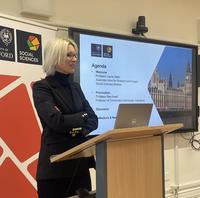The changing dynamics of democracy
Democracy is more than just an academic interest—it is a pressing global priority.
From the implications of recent elections and the rise of misinformation to the challenges posed by AI and climate change, the stability and evolution of democratic systems are central to our collective future. Recent events highlight the broader impact of political instability on research and international collaboration, which underscores the urgency of understanding and strengthening democratic institutions.

Professor Louise Slater
Responding to this urgency, scholars from across the social sciences came together in the latest interdisciplinary Common Ground seminar, led by Professor Louise Slater (Associate Head of Division (Research & Impact)) and with a keynote from Professor Ben Ansell (Department of Politics and International Relations), to explore key questions around the biggest challenges facing democracy, and how can we tackle them.
As an expert in comparative democratic institutions, Professor Ansell’s compelling keynote addressed the changing dynamics of democracy worldwide. He explored how voting patterns have evolved over time and discussed the role of bias and personal choice in political decision-making, prompting reflection on how these factors shape electoral outcomes and public trust in democratic institutions.
Emphasising the importance of interdisciplinary collaboration in addressing these challenges, Professor Slater noted that funding bodies such as the ESRC and ERC have recognised the profound importance and implications of global democracy for societal progress and global cooperation. This is particularly relevant for international collaborations, including those with nations navigating shared democratic challenges.

Professor Ben Ansell, Professor of Comparative Democratic Institutions, Department of Politics and International Relations
Challenges and opportunities
Following the lecture, participants engaged in a roundtable discussion on the key challenges confronting democracy, and how can we tackle them. The conversation generated a wealth of ideas, with a strong focus on the importance of civic and political education, particularly in universities. Participants highlighted the need to teach not only the mechanics of voting but also the broader social responsibilities that underpin a healthy democracy.
In closing, Professor Slater drew the attention of the group to two relevant upcoming collaborative funding schemes:
- ERC Synergy Grant, with an expected deadline of November 2025. Collaborative bid between 2-4 PIs across the UK and Europe to tackle ambitious research problems.
- ESRC Responsive mode: Research Grants (no deadline). This opportunity is for strategic research from any disciplines and on any topics in ESRC’s remit – including Democracy.
Groups of social sciences researchers interested in developing a collaborative bid to these funding schemes should contact the Research, Impact & Engagement team, who would be happy to support the group's application.
About Common Ground
The Common Ground seminar series brings together researchers from across the University to explore how social scientists can contribute to major challenges and promote interdisciplinary research activities. Check the series homepage for the latest news on forthcoming seminar themes.